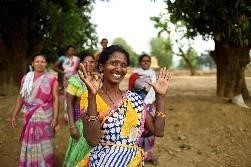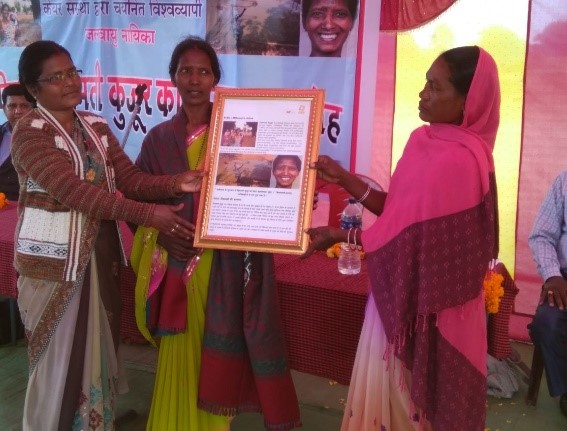LIVELIHOOD
 Dilmani Kujur is a woman farmer and role model in her region. She belongs to the Jududand village of Bagicha block that falls under the ‘Where the Rain Falls Project’. With support from CARE India, she transformed five percent of her arable land into a water storage pond that collects rainwater and irrigates her agricultural fields. The water harvesting structure developed under the project on Dilmani’s five percent of arable land facilitates her to cultivate paddy and grow vegetables in her agricultural fields.
Dilmani Kujur is a woman farmer and role model in her region. She belongs to the Jududand village of Bagicha block that falls under the ‘Where the Rain Falls Project’. With support from CARE India, she transformed five percent of her arable land into a water storage pond that collects rainwater and irrigates her agricultural fields. The water harvesting structure developed under the project on Dilmani’s five percent of arable land facilitates her to cultivate paddy and grow vegetables in her agricultural fields.
The ‘’five-percent-model’’ not only benefits her family but the community around her as well. The produce from the field, when sold in the market, helps Dilmani and the women around her to make an extra income and sustain their families.“We can be even more successful if we work together’’, says Dilmani. She further believes that in the future her small enterprise will pay for a lot more than just her children’s school fees.
 In a recent Photo exhibition, she was selected by CARE France as one of the top 11 climate heroines across the globe. The project team organised an event to recognise Dilmani’s efforts and encourage other women in the area to partake in similar economic initiatives. She was congratulated by the Sarapanch of Tambakachar, Grampanchayat Smt. Hirabati Nag and the District Panchayat member, Smt. Karesia Bhagat. She was felicitated with a memento in the presence of dignitaries from Agriculture, Horticulture and Forest Department of Bagicha block.
In a recent Photo exhibition, she was selected by CARE France as one of the top 11 climate heroines across the globe. The project team organised an event to recognise Dilmani’s efforts and encourage other women in the area to partake in similar economic initiatives. She was congratulated by the Sarapanch of Tambakachar, Grampanchayat Smt. Hirabati Nag and the District Panchayat member, Smt. Karesia Bhagat. She was felicitated with a memento in the presence of dignitaries from Agriculture, Horticulture and Forest Department of Bagicha block.
During the felicitation ceremony, she emphasised on how women should not be dependent on others for any work that concerns them and their families. She further added that women from the underprivileged section, must work hard and engage in economic activities to sustain their family and earn a living for themselves. Her determination helped her succeed in agricultural activities in addition to her engagement in activities like catching fish, backyard poultry and goat rearing activities. With the income from these alternative sources, she could send her children to school and attain formal education. She hopes this will allow her children to lead a decent life in future.




